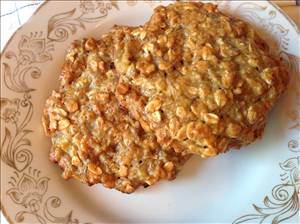Cottage Cheese vs Ricotta, Which Cheese Supports PCOS?
Discover which cheese - cottage cheese or ricotta - better supports PCOS management through protein content, calcium benefits, and blood sugar impact.
Very tasty low fat cookies for a great fiber snack and a great way to use old bananas.
This recipe includes superfoods such as:
Cinnamon is one of the best ingredients that someone with insulin sensitivity can eat. Half a teaspoon of cinnamon per day has been shown to be very effective at normalizing blood sugar levels. Cinnamon contains hydroxychalcone, which is thought to enhance the effects of insulin. It has also been suggested that Cinnamon prevents post-meal blood sugar spikes by slowing the gastric emptying rate - meaning that food digests slowly. (Reference: http://www.ncbi.nlm.nih.gov/pubmed/11506060). Nuts are a natural source of Inositol, a derivative of Vitamin B (which is often prescribed in the form of supplements for women with PCOS). Inositol can effectively control the symptoms of PCOS by reducing insulin resistance and improving insulin sensitivity.
Walnuts are an excellent addition to the diet for managing PCOS symptoms. These nutrient-dense nuts are packed with healthy fats, protein, fiber, and essential vitamins and minerals. But what makes walnuts particularly beneficial for individuals with PCOS?
Walnuts are one of the best plant-based sources of omega-3 fatty acids, which are known for their anti-inflammatory properties. Reducing inflammation is crucial for managing PCOS symptoms, as chronic inflammation can exacerbate hormonal imbalances. Omega-3s also support heart health, which is important since women with PCOS are at a higher risk of cardiovascular issues.
Walnuts are rich in magnesium, a mineral that plays a key role in regulating insulin levels and improving insulin sensitivity. Magnesium also helps reduce inflammation and supports muscle and nerve function. Adequate magnesium intake can help manage blood sugar levels and reduce the risk of type 2 diabetes, which is commonly associated with PCOS.
The high fiber content in walnuts helps regulate digestion and maintain stable blood sugar levels. Fiber also promotes a feeling of fullness, which can aid in weight management, a crucial aspect of managing PCOS. Including walnuts in your diet can help prevent overeating and support digestive health.
Walnuts are loaded with antioxidants, which help protect the body from oxidative stress and damage caused by free radicals. This is particularly beneficial for individuals with PCOS, as oxidative stress can worsen symptoms and lead to further health complications. Antioxidants in walnuts support overall health and can help mitigate some of the negative effects of PCOS.
You might wonder, "How can I include walnuts in my meals?" Here are some ideas:
Another common question is, "Can I eat walnuts every day?" Yes, you can include walnuts in your daily diet, but moderation is key. While walnuts are high in calories due to their fat content, these are healthy fats that provide numerous health benefits. Aim for a small handful (about 1 ounce) per day as part of a balanced diet.
Walnuts are also a sustainable food choice. They are grown in various regions and have a lower environmental impact compared to many other nuts. Choosing walnuts supports sustainable farming practices and provides a nutritious, eco-friendly option for your diet.
In summary, walnuts are a highly nutritious food that offers numerous health benefits for managing PCOS. Their omega-3 fatty acids, magnesium, fiber, and antioxidants support heart health, reduce inflammation, improve insulin sensitivity, and promote overall well-being. With their versatility and delicious taste, walnuts are an excellent addition to any diet focused on PCOS management.
1/2 cup flour
1 cup dry oatmeal
2 small bananas
1/2 cup sugar
1 tbsp butter
1 medium egg
1/2 tsp cinnamon
1/2 tsp baking soda
1/2 cup walnuts, chopped
1 dash salt
1. Preheat oven to 390 °F (200 °C).
2. Combine all the dry elements together, flour, oatmeal, cinnamon, pinch of salt and baking soda.
3. In another bowl mix the butter with the sugar and add the egg.
4. Squash the bananas and mix them with the egg and sugar.
5. Add the walnuts to the dry bowl and mix everything together.
6. Dispose the cookie dough on a cooking sheet and put in the oven for 7 minutes, lowering the heat.
7. Let cool and enjoy.

Serving Size: 8
| Amount Per ONE Serving | ||
|---|---|---|
| Calories 206 kcal | ||
| Fat 7.64 g | ||
| Carbohydrate 31.76 g | ||
| Protein 4.45 g | ||
| Iron 40 mg | ||
| Calcium 16 mg | ||
| Cholesterol 27 mg | ||
| Monounsaturated Fat 1.46 g | ||
| Polyunsaturated Fat 3.94 g | ||
| Saturated Fat 1.69 g | ||
| Sodium 176 mg | ||
| Sugar 15.98 g | ||
| Potassium 172 mg | ||
| Vitamin A 10 mcg | ||
| Vitamin C 30 mg | ||
| Fiber 2.4 g | ||
Managing PCOS can be challenging, but you don't have to do it alone. Join our supportive community to connect with others who understand what you're going through, share tips, and get encouragement. Here's how you can get involved:
Subscribe to our Newsletter: Receive PCOS-friendly recipes, tips, research updates, and more delivered straight to your inbox. Stay informed and empowered with the latest information and support.
Join our Telegram Channel: Stay updated with the latest tips and advice on managing PCOS.
Follow us on Facebook: Engage with our community, participate in discussions, and get support from others.
Break the cycle with the PCOS Meal Planner - your personalized guide to eating better, feeling better, and managing PCOS symptoms. Take control today!

Forget the frustrating cycle of weight loss attempts, endless medications, and living in discomfort. Introducing the PCOS Meal Planner. A meal planning guide that goes beyond temporary fixes to offer a comprehensive strategy, empowering you to ignite a transformation towards lasting health and happiness. Step into a world where you control your PCOS, not the other way around.
Unlock Your PCOS Freedom Now.
Discover which cheese - cottage cheese or ricotta - better supports PCOS management through protein content, calcium benefits, and blood sugar impact.
Discover which is better for PCOS: rice bowls or salad bowls? Learn how to make the best choice for blood sugar balance and PCOS management.
Discover which cold beverage - iced coffee or iced tea - better supports your PCOS management goals with evidence-based comparisons and tips.
Discover how progesterone cream may help manage PCOS symptoms, proper application methods, and evidence-based insights for making informed decisions about usage.
Discover our nourishing PCOS tea blend recipe that helps manage symptoms naturally with anti-inflammatory herbs and metabolism-boosting ingredients.
Learn essential batch cooking strategies for PCOS management. This beginner-friendly guide helps you plan, prep, and store nourishing meals to support your health.
Understand the connection between PCOS and trauma. Learn actionable steps to manage PCOS symptoms.
Discover the best breakfast foods for PCOS that help balance hormones, manage blood sugar, and start your day right - with practical meal ideas.
Find PCOS-friendly beach snacks to enjoy without disrupting your health goals. Practical tips and recipes inside.